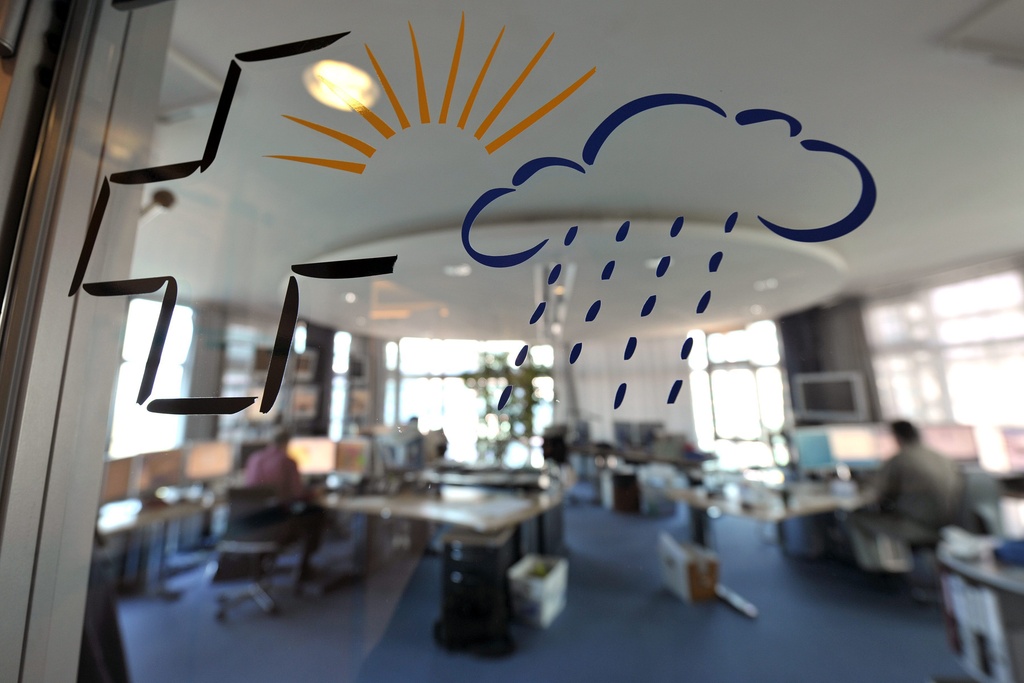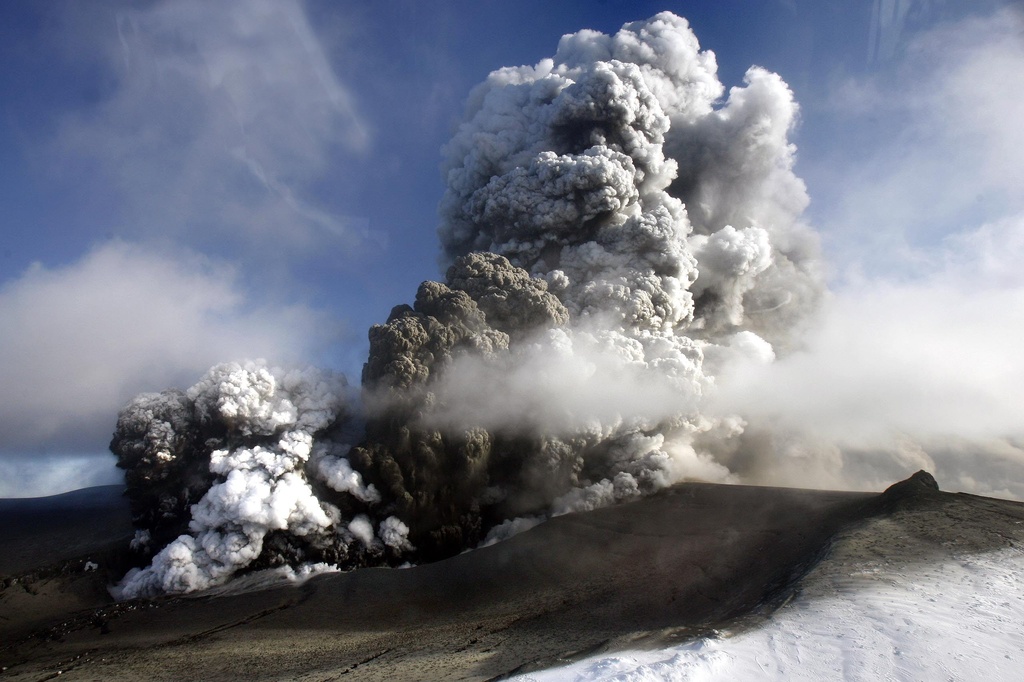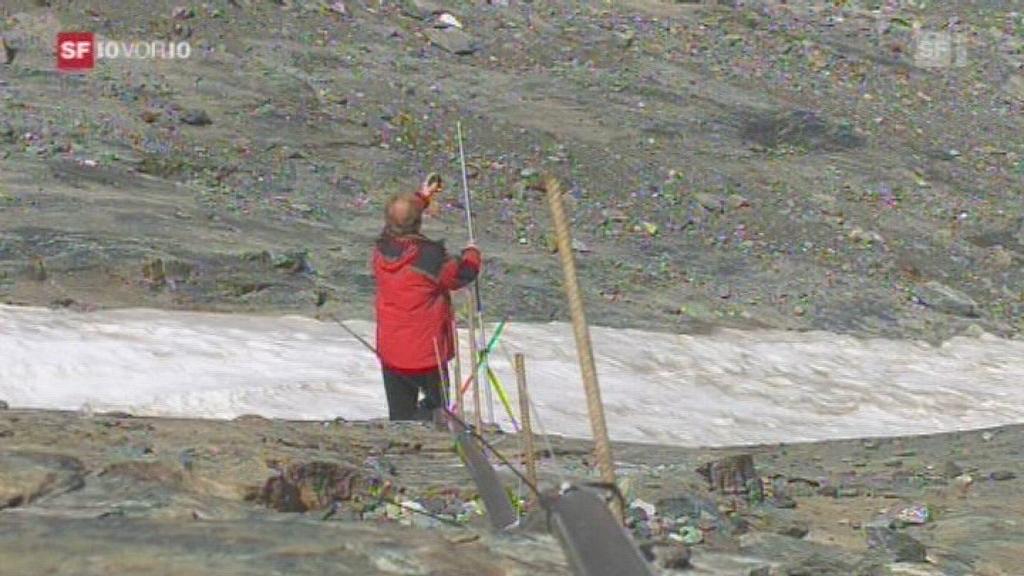Winds of reform sweep Swiss weather service

Reforming the national weather service MeteoSwiss is a huge challenge but will force it to become more flexible and customer-oriented, say officials.
New MeteoSwiss director Christian Plüss and his deputy Gerhard Müller told swissinfo.ch about the future of the Swiss weather service on the sidelines of the 16th World Meteorological Organization (WMO) Congress in Geneva.
In December 2010, the Swiss government announced reforms to MeteoSwiss, which was established in 1881.
Under the proposed changes, the weather service, currently part of the interior ministry, will become a decentralised federal institute that continues to provide national meteorological and climate information but increases commercial activities with the private and public sectors.
A new law supporting the re-organisation is currently being scrutinised by parliament. The new structure should be formalised in 2014.
The two directors are currently heading a high-level Swiss delegation at the meteorological congress, which runs until June 3.
swissinfo.ch: Why is such a radical transformation necessary at MeteoSwiss?
Christian Plüss: The liberalisation of weather information is a European trend and Switzerland has decided to follow. It’s an economic trend, not just weather-related; it’s a fundamental discussion about how far services should be offered by the state.
In Europe there are big differences. You have organisations like the British Met Office, which operates like a business, and others that are totally part of the national administration. But the trend is clearly towards greater liberalisation.
There is also a move to reduce the number of airspaces in Europe and weather services are very closely linked to air traffic.
It will force us to become more flexible and customer-oriented. This is something not only MeteoSwiss is being asked but other public services in general.
Gerhard Müller: It’s clear that the government is not ready to pay more in the future – they want to pay less. It’s also clear that there is a huge market for such services and a large part cannot be covered by the private sector so there is a gap for us to fill.
swissinfo.ch: Do you intend to replicate the Met Office model?
G.M.: We studied 12 different models and there are not many good ones that can be applied to our case. It’s not easy to compare; if you look at the Met Office, or the New Zealand weather office, which is 100 per cent privatised, they also cover maritime services over a huge area. We are just a small country.
swissinfo.ch: What kind of product and service you will be offering?
G.M.: What we are trying to deliver is products for other agencies, like the cantons and communes. For example in canton Valais they need better observation networks for extreme weather incidents like heavy rain or avalanches.
The Federal Roads Office is also building a new network of highways and services for drivers and has asked for our support.
swissinfo.ch: Switzerland is supporting the creation of a Global Framework for Climate Services, which is one of the major issues under discussion at the WMO congress. Why is this so crucial?
C.P.: The detection of climate change is only possible if we have reliable data from all over the world. This initiative will provide global standards on how [scientific] climate change information is provided and accessed.
G.M.: So far met offices have concentrated on providing weather forecasts; now it’s time for climate services – information about the climate, how it will change and what this means for individuals. We want to make climate change more tangible.
swissinfo.ch: There will also be talks in Geneva on the WMO’s aeronautical meteorology programme, especially in light of the disruption caused by the Icelandic volcanic ash cloud crisis in 2010. Apparently there is unhappiness in the way things were handled. What is your position?
G.M.: It was a unique event. We had to get organised, not just the weather services but the entire aviation sector – air traffic management and aviation partners; it was unsatisfactory.
Limits allowing flights were changed several times during this period as there was a lack of knowledge about the consequences of certain [ash] concentrations for airplanes. There were also political and financial games going on.
The aviation industry should fix better limits. If we know these, we can use models to calculate concentrations anywhere on the earth. Not knowing the limits is the main issue to be solved.
swissinfo.ch: According to MeteoSwiss, the first four months of 2011 were drier than same period in 1976, one of the six driest years on record. Is Switzerland heading for one of its worst ever droughts?
G.M.: I would really like to answer that simple question, but I can’t.
MeteoSwiss, part of the interior ministry, provides the population, public bodies and businesses with meteorological and climate information.
It employs around 350 people. 800 non-professional observers man its recording stations.
Half of its SFr80 million ($90 million) budget is allocated by the federal authorities. The remainder comes from payments for the services it provides, especially from the aviation sector.
Drought in much of Europe looks set to continue with little relief for parched farmland until June at the earliest, forecasters say.
Parts of central Europe saw less than 40 per cent of their long-term average rainfall from February to April, with even the wettest seeing less than 80 per cent of the mean for 1951-2000, according to the Global Precipitation Climatology Centre.
The stubborn high pressure systems that tend to bring dry weather to continental Europe show little sign of being pushed aside by typically wetter lows, except in northern areas where grain production is low, according to the European Centre for Medium-Range Weather Forecasts.
The worst-ever droughts in Switzerland were recorded in 1884, 1921, 1947, 1953, 1976 and 2003.

In compliance with the JTI standards
More: SWI swissinfo.ch certified by the Journalism Trust Initiative







You can find an overview of ongoing debates with our journalists here. Please join us!
If you want to start a conversation about a topic raised in this article or want to report factual errors, email us at english@swissinfo.ch.